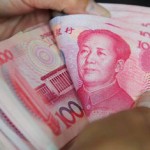Chinese Companies, Investors Move Money Back Home

Shares of Chinese companies are soaring at home but stumbling overseas, and one reason is fast-trading Chinese investors.
That is leading some companies and investors to shift money back home after riding a rally in Chinese stocks in the U.S., which was capped by the stunning IPO of Alibaba Group Holding Ltd. in September.
Gang Hu, an entrepreneur in Shanghai, sold his business last year and invested in a dozen U.S.-listed Chinese stocks, such as social media company YY Inc., Internet security provider Qihoo 360 Technology Co. and online beauty products retailer Jumei International Holding . His holdings went up 20% through the summer, but are now down 15%. He lost $600,000 on Jumei alone, which is now trading 40% below the price of its May 2014 IPO.
Frustrated about losing his hard-earned wealth in the U.S. market, he’s shifting his money back home, opening a China stock market account in the belief the Shanghai market can keep rising after its 60% rally last year. “There’s a lot of liquidity in China and the government is keen to revive the Chinese stock market,” said Mr. Hu. “Some of my friends are saying the index can still double.”
That view is a big turnabout for Chinese investors, who shunned the market for real estate and trust product investments after a dismal five-year run. Now they are pulling cash from these other investments, as well as overseas markets, to buy Chinese stocks at home.
Western interest in overseas Chinese stocks appeared to peak soon after the Alibaba IPO. An index tracking 30 U.S.-listed technology companies has fallen 12% since November. Internet security provider Qihoo has fallen 44% from its August peak now trading at the lowest level in 18 months, even Alibaba is down 17% from its November high.
Eric He, chief financial officer of YY.com, a website for users to interact with performers or fellow gamers in real-time online, blamed the Chinese stock market’s rebound for YY’s 30% fall since September.
“You see a big difference if you compare our trading volume in December versus a few months ago, and the trading volume on the Shanghai exchange,” said Mr. He, adding that most of the investors he talks to are Chinese, and they are chasing hot returns in China now.
Feeling unloved, China’s U.S.-listed Internet darlings are considering moving their listings back home. Perfect World Co. said Jan. 2 it received an offer from its founder and chairman to buy the shares he doesn’t own to take the company private. The plan, according to a person familiar with the situation, is to relist the company in the Shanghai market. The stock was down as much as 40% from its March high before his offer, which was a 27% premium on the previous closing price.
One big driver of the rally in China and the movement of cash into the market from overseas is the Hong Kong-Shanghai Connect, the program launched late last year that allows foreign investors to more easily buy shares in Shanghai and Chinese investors to put money in Hong Kong’s market.
Although this program has received a lukewarm response from foreign investors, brokerage firms in Hong Kong say some of their biggest clients are Chinese.
There are good reasons for Chinese with cash overseas to seize on this program. Once they have money out of the country, few people want to bring it back. But the Hong Kong-Shanghai Connect allows Chinese to buy shares through their accounts in Hong Kong.
The program also gives them a more discreet way to invest in China. China’s stock regulator has stepped up its scrutiny of stock trading, saying it would find both “small rats” as well as “big tigers” who engage in offenses like insider trading.
In China, every investor has their account in a centralized system, so it is easier for the regulator to look at their trading. But in Hong Kong, the accounts are with Hong Kong brokers. For trades from Hong Kong Shanghai Connect, regulators will just see they are from the Stock Exchange of Hong Kong without knowing who is behind them.
Lastly, investors can also borrow more cheaply in Hong Kong, paying 2.5% versus 7% to 8% in China. Some Chinese brokerage firms even allow clients to borrow money in China, using their overseas assets as collateral, though this may raise a red flag among Chinese regulators, who are becoming more concerned about unregulated capital flows.
The shift of momentum-driven Chinese money back home may create an opportunity for value-minded investors to snap up battered overseas-listed Chinese stocks. YY and Qihoo are now trading at 17 times their estimated earnings for 2015, well below their peaks.
Source: wsj – Chinese Companies, Investors Move Money Back Home




























